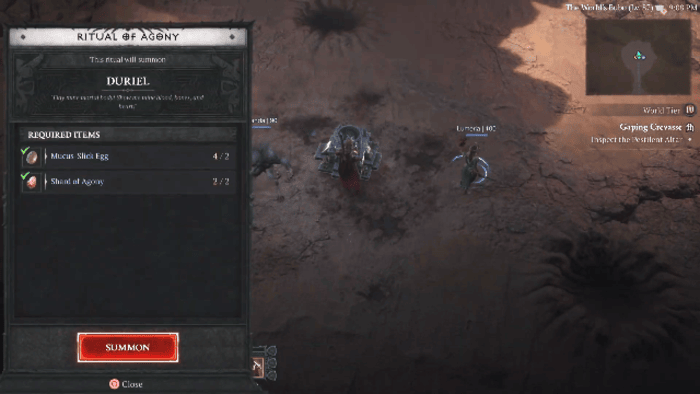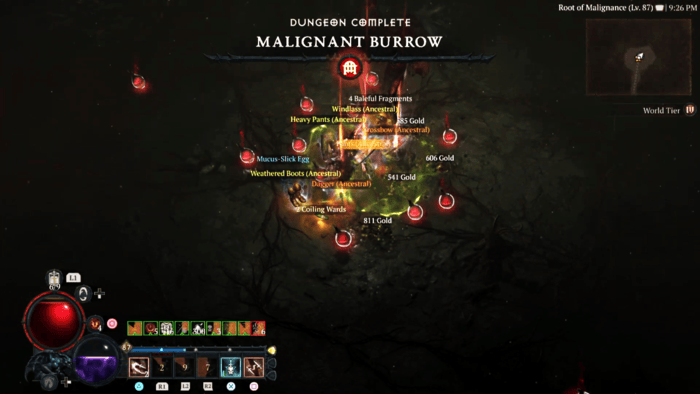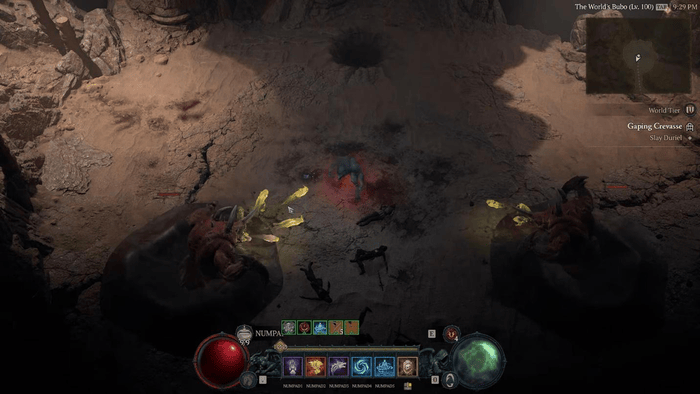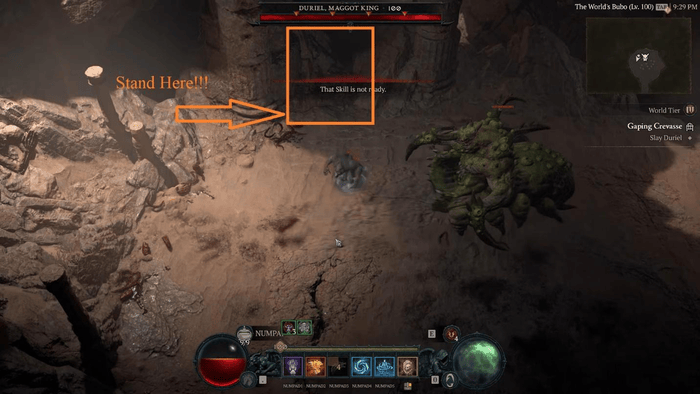Duriel is perhaps one of the toughest endgame bosses in Diablo IV. He is fast, agile, poisonous, and extremely difficult to tackle for anyone lower than character level 100. However, defeating this giant Maggot is a must for anyone looking for rare drops and mythic unique items.
That being said, D4 season 7 now features Uber Duriel, meaning you can summon the Echo of Duriel as many times as you like and defeat him to increase your odds of dropping exquisite rewards.
The only problem is that you must first gather the summoning materials for the Duriel Diablo 4 boss, which means defeating two equally hard bosses in Torment +1 difficulty. Feeling confused? Well, don’t worry! In this article, we will discuss how to summon and defeat Duriel, King of Maggots in Diablo IV, and much more, let’s start:
How To Summon Duriel Diablo 4?

The Tormented Echo of Duriel is an Uber boss that you can summon and defeat multiple times after completing the main campaign. He first appeared in Season 2 of Diablo IV and has since then remained a hotspot for collecting Legendary gear items.
However, he is near the top of the Uber boss ladder in the game, so it can be pretty tricky to find, let alone grind his summoning materials.
According to some players, half the battle is won once you master where and how to collect these rare resources. Once you have the required materials, head to the special summoning Altar, make the sacrifice, and finally defeat him to get a 7.5% chance to drop Mythic Uniques.
Where to Get Duriel Boss Materials?

According to the Diablo 4 Season 7 patch notes, players will need the following items to summon Echo of Duriel:
- 2x Mucus-Slicked Eggs: You can farm the Mucus-Slicked Eggs by defeating Varshan in Torment 1+ difficulty. However, you must first summon the Echo of Varshan in Malignant Burrow, which requires completing the Tree of Whispers optional objectives in Hawezar to collect Malignant Hearts.
- 2x Shards of Agony: As for the Shards of Agony, you must summon and defeat the Echo of Grigoire in the Hall of Penitent on Torment 1+ difficulty settings. Furthermore, you must sacrifice 5x pieces of Living Steel, which you can acquire by opening Torture Chests of Living Steel in Helltide Events.
Note: These Boss Mats will only drop if the player has summoned the Echo of these bosses. Also, the drop rate is 100%, so you can farm these items if you don’t wish to go back and forth after every Duriel encounter.
Similarly, if you are going for the Tormented Duriel Diablo 4 boss, you will need even more ingredients:
- 6x Mucus-Slick Eggs
- 6x Shards of Agony
- 1x Stygian Stone [Update: Stygian Stones are no longer required to summon Tormented bosses after Season 6]
Alternatively, you can just skip the hassle and buy Diablo 4 Boss Materials for a smooth ride through the dungeons. This method is far more efficient, especially for players looking to farm the entire Duriel loot table.
How to Find Duriel Boss Location?

Once you have collected the sacrificial components to summon the Echo of Duriel, you are ready to face the Legendary Uber boss. Simply head to the Gaping Crevasse dungeon in Kehjistan, near the capital, Gea Kul.
Just make sure to switch the worlds, as this dungeon is only available for level 50 players on any Tormented Tier. Oh, and don’t forget to grab the Elixir of Poison Resistance II from the Alchemist, as it will come super handy during the face-off.
How To Fight Duriel Diablo 4?
Now comes the fun part, defeating the Tormented Duriel Diablo 4 is no easy job even if you are playing in a party of pros. So, if you are thinking about one-shotting this beast on your own, well, think again!
Fortunately, after spending countless hours trying to figure out the fastest way to kill Duriel, we came up with the perfect plan. Thanks to IGZ, we had more than enough boss materials at our disposal for all those hefty attempts.
Let’s walk you through our foolproof plan on how to sure-kill the Uber Duriel boss every time:
Step 1: Clear the Dungeon

Once you enter the Gaping Crevasse dungeon, you will be welcomed by a bunch of Duriel’s followers, Heralds, and Disciples. However, you have already finished the main campaign, reached level 50+, and unlocked Tormented difficulty, so they won’t be a problem.
Once you clear the dungeon, go all the way to the other side and sacrifice the boss materials at the Pestilent Altar to start the Echo of Duriel Diablo 4 boss fight.
Step 2: Cheese the Boss Fight

Now that you have summoned Echo of Duriel, the Maggot King, it is time to get to work. Unlike other Uber bosses in the ladder, this one is pretty fast and comes with several deadly abilities like Claw Slash, Poison Pool, Charge, Devouring, Burrowing, and Maggots.
So, you need to manage your HP, drink the Elixir before starting the fight, and, of course, follow our cheese method. Traditionally, the boss fight consists of two phases, and only a few players manage to see through the second one.
As soon as the battle begins, quickly deal with the two Pangs of Duriel minions, as they will harass you throughout the fight. Next, head straight towards the cliff’s edge and gather all your party members in the small notch between the cliffs.
This will limit Duriel’s movements and keep his charged attacks focused in one direction. Now, sit back and keep spamming your deadliest attacks. The goal is to prevent him from going underground, as it will then trigger the second phase of the battle.
In most cases, you will manage to kill Duriel before he enters the second phase. If, for some reason, you miss your chance, just get out of the notch, kill the new spawns, and wait for the boss to come back. At this point, rush back to the notch and commence your attacks until you defeat the boss.
Note: This cheese method doesn’t seem to work for the Tormented Duriel Diablo 4 fight. So, if you don’t want to lose your hard-earned Tormented Duriel Mats, we suggest that you stick to the regular boss until we find another cheesy way.
All Duriel Loot Table Rewards

Duriel is a higher-tier boss who resides almost at the end of the boss ladder. So, naturally, even his lesser drops will be unique, and the Uber Unique items will definitely be mind-boggling.
Therefore, we suggest that you should keep farming this boss fight and cheese around your way to get some of the best possible loot in Diablo 4.
| Class | Unique | Uber Unique |
| Barbarian |
|
|
| Druid |
|
|
| Necromancer |
|
|
| Rogue |
|
|
| Sorcerer |
|
|
| All Classes |
|
|
| Cosmetics |
|
|
Conclusion
To sum it up, Echo of Duriel, the Maggot King, is one of the toughest Uber bosses in Diablo IV. However, players are obsessing over this boss as the rewards are just too valuable to miss. The only problem is that you must defeat two other bosses to drop the summoning materials for Duriel.
Fortunately, our cheesy method will help you farm the Doombringer Diablo 4 and even the Brimstone Mount. Keep farming Duriel for the best loot in Diablo 4, and stay tuned for more boss-killing strategies!

